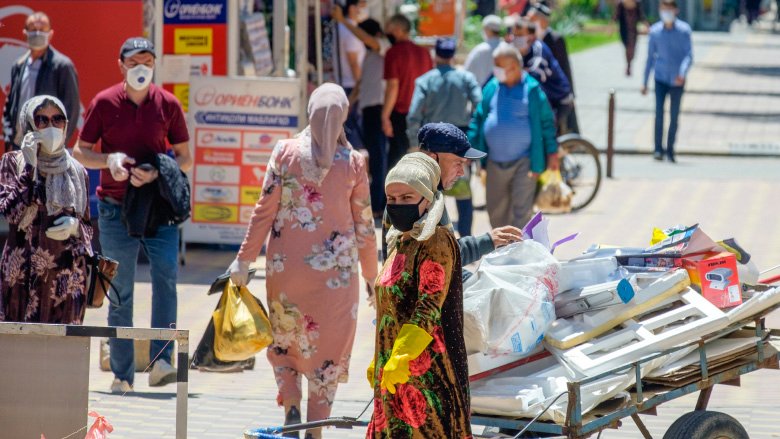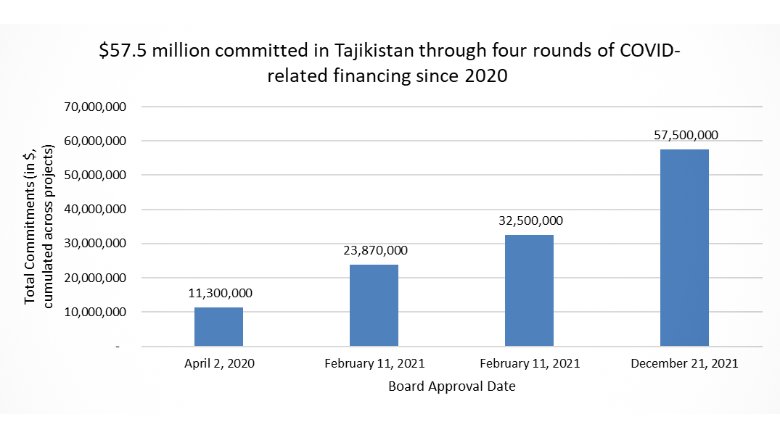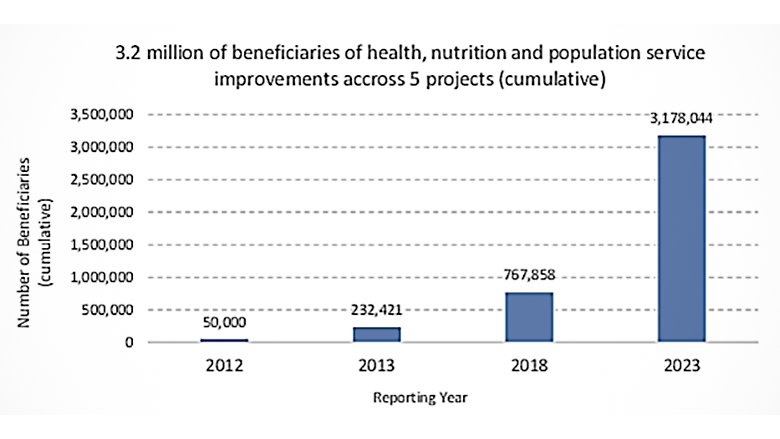Key Highlights
- 2.2 million beneficiaries from a health services improvement project, 76 percent of whom are women and girls.
- Nearly 900,000 doses of Moderna’s COVID-19 vaccines procured and delivered.
- One-time emergency cash assistance provided to around 234,000 vulnerable households, of which 26 percent are female-headed.
- Nearly 3 million people registered in the new electronic COVID-19 vaccination registration system.
- $57.5 million committed in Tajikistan under the Tajikistan Emergency COVID-19 project original grant and three additional financing packages since 2020.
- $957 million in commitments in Tajikistan across FY20-FY23.
Challenge: Vulnerabilities Exposed by COVID-19
Tajikistan has experienced an improvement in living standards over the past two decades, with the poverty rate falling from 32 percent in 2009 to 13.4 percent in 2022. However, the country’s undiversified economy, reliance on migrant remittances, and high risk of debt distress, make it more vulnerable to external shocks. The recent COVID-19 crisis significantly increased uncertainties and risks for Tajikistan, highlighting the health sector’s weaknesses, and leading to increased poverty and food insecurity for the most vulnerable.
The “Listening to Tajikistan” survey monitored the well-being of people, focusing on the impacts of the COVID-19 pandemic, based on more than 17,000 interviews with people from all regions of the country. The survey found that people’s economic well-being deteriorated severely in 2020; 40 percent of respondents reported that no family member was actively working in May 2020. Food security also deteriorated in 2020 as incomes fell and food prices went up, and in May and June 2020 over 35 percent of households said they had to reduce their food consumption. These impacts were exacerbated by a 20 percent decline in remittances, in a country where more than half of households rely on this source of income to buy food and other basic necessities.
Approach: From Pandemic Response to Prevention and Preparedness
June 4, 2023 marked 30 years of partnership between Tajikistan and the World Bank, and 29 years of Tajikistan belonging to the International Development Association (IDA). During this period, the World Bank provided over $2.8 billion in support for improvements to infrastructure, education, healthcare, poverty reduction, and more. These operations are providing better health services for the country’s population by strengthening institutional capacity, providing training and equipment, addressing child malnutrition, and providing vaccination and other support against pandemics such as COVID-19.
At the onset of the COVID-19 outbreak, Tajikistan was one of the first countries in the world to receive emergency support from the World Bank, which worked with the country’s Ministry of Health and Social Protection of the Population (MOHSP). An original IDA grant of $11.3 million was approved for the Emergency COVID-19 Project to: i) strengthen the country’s capacity to provide intensive care to people sick with COVID-19 (e.g. through renovation and equipment for intensive care units); ii) help communities reduce infection (e.g. by providing personal protective equipment for health care workers, and information and behavior change communication for the general population); and iii) protect the vulnerable (e.g. with cash transfers to protect children vulnerable to malnutrition). This support was reinforced by three rounds of additional financing: $8.63 million for COVID-19 vaccines, $12.57 million in grant financing for additional cash transfers, strengthening of oxygen supply, and a stop-gap funding for routine child immunization (February 2021), and a $25 million grant for the procurement and provision of additional vaccines (March 2022).
The World Bank’s focus has subsequently shifted towards addressing critical gaps in pandemic prevention, preparedness and response (PPR). Given the success of the national vaccination campaign and lower demand for COVID-19 vaccines, in 2023, the project was restructured to strengthen the country’s sanitary and epidemiological services (SES), laboratory capacity, and digitalization of information systems. PPR is also part of the recently approved health project Millati Solim – Health Nation.
At the regional level, this impetus is translating into initiatives like the Central Asia One Health Framework for Action. The World Bank is collaborating with several Central Asian countries on the Framework, which will help address three shared high-level goals: pandemic prevention and preparedness, the resilience of food systems, and improving regional trade and agricultural sector competitiveness.
Results: Crisis Response and Social Protection
The World Bank committed a total of $57.5 million under the Tajikistan Emergency COVID-19 Project to help strengthen the country’s response to the pandemic and support vaccine procurement and delivery. The results achieved around the three key areas of the project include:
- Upgrading medical facilities and equipment: World Bank resources have helped strengthen Intensive Care Units (ICU) in 10 hospitals across the country by providing equipment, medical supplies, personal protective equipment, and through targeted renovations. Sustainable investments were also made to improve oxygen supply in 15 hospitals across Tajikistan to help not only those suffering from severe COVID-19 infection, but also other patients, access life-saving oxygen therapy.
- Helping communities reduce infection: World Bank funding has supported activities to strengthen COVID-19 communication and public outreach, with the training of over 170 journalists and 1,000 community volunteers. The World Bank’s funding also supported the national COVID-19 hotline which now serves as an important tool for the MOHSP to provide information to the population of other health topics as well.
- Protecting the vulnerable: One-time emergency cash assistance was provided to approximately 234,000 vulnerable households across the country to mitigate the impacts of food price shocks caused by the pandemic, of which 26 percent were female-headed. Project monitoring data show that over 90 percent of the beneficiaries have used the cash transfers to purchase food items and medical services and medicines for children.
- Digitalizing the health system for better preparedness: The project financed the development and rollout of an electronic COVID-19 registration system which, in a short time, registered nearly three million records. This experience has demonstrated both the importance and the feasibility of digitalization of health information. Currently, the project is financing the expansion of the system to the registration of routine vaccination, and notifiable diseases, and the overall strengthening of the digital capacity of the Ministry and its sanitary and epidemiological services.
“We are grateful for the efforts of the Government and the World Bank in providing modern facilities for us. It has been three days after my father’s surgery. He is feeling better now,” says Mirzosharif Sobirov, a resident of Tajikistan’s Varzob district.
With World Bank support, Tajikistan was able to procure almost 900,000 doses of Moderna’s COVID-19 vaccine. 98 percent of all adults - Tajikistan’s COVID-19 vaccination target group (57 percent of the overall population) was vaccinated as of June 2023.
Data Highlights
Partnerships: Leveraging Global Expertise
The World Bank has collaborated with several international partners in supporting Tajikistan against the impacts of the COVID-19 pandemic. In particular, the Bank drew on the expertise and reach of the relevant United Nations agencies; much of the medical equipment financed by the World Bank was procured by the United Nations Office for Project Services (UNOPS), for example. COVID-19 vaccines were procured in collaboration with COVAX, Gavi, the vaccine alliance, and UNICEF. Tajikistan’s emergency program also fostered collaboration with UNICEF to protect vulnerable households by providing them with important information on optimal child nutrition, stimulation, and parenting practices to help children stay healthy and grow to their full potential, despite the challenges of the pandemic.
Looking Ahead: Laying the Groundwork for Growth
Despite the multiple overlapping crises affecting the country over the last decade -the 2008 financial and economic crisis, 2014 oil price collapse, 2016 banking crisis, and 2020 coronavirus pandemic - Tajikistan has enormous growth potential. The Government has set an ambitious target to increase domestic incomes by 2 to 3.5 times between 2016 and 2030. This will require a new growth model based on a set of reforms in the areas of taxation, digital transformation, and food supply chains, combined with a dynamic private sector that is motivated to invest and create jobs for the country’s young rapidly growing population. After 30 years, the World Bank is committed to supporting Tajikistan in fostering innovation, dynamism, exports, and profitable enterprises, while developing its human capital, and strengthening its resilience to fragility and future crises.




